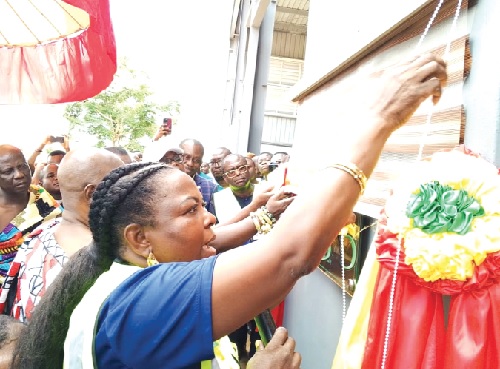
Integrated recycling, compost plant inaugurated at Sunyani
THE Minister of Sanitation and Water Resources (SWR), Lydia Seyram Alhassan, has inaugurated the Sunyani Integrated Recycling and Compost Plant (IRECOP) to convert waste into valuable resources and improve sanitation.
Located at Nwawasua, near Sunyani in the Bono Region, it specialises in composting, enabling the conversion of over 60 per cent of solid waste daily from the area into high-quality compost, a valuable product for organic farming.
The facility, which has a processing capacity of 400 tonnes of solid waste per day, can also produce 124,000 tonnes of organic fertiliser annually.
Other recoverable materials of the recycling process, including plastics, paper, glasses and metal scraps will serve as input materials for the steel and plastic manufacturing sectors.
The plant, which will receive, sort, process and recycle solid waste generated in the area, presents a modern solution to the waste challenge in the area.
Employment
The facility will serve as the centralised point for waste storage in the region and it is expected to create more than 1,000 jobs.
The IRECOP plant has been equipped with specialised waste vehicles such as trailers and tricycles to transport waste from communities to the plant.
In 2020, President Nana Addo Dankwa Akufo-Addo cut the sod for construction of the facility and other similar facilities across the 16 regions.
IRECOP plants are being constructed in partnership with the Ministry of SWR and the Jospong Group of Companies to promote environmentally friendly farming practices.
Waste management
At the inauguration ceremony last Tuesday, Ms Seyram Alhassan said the facility would enhance the environment and transform waste management in the area.
She said the plant would also serve as a sustainable waste management, resource conservation and environmental protection facility.
She said the facility would employ cutting-edge technology that had a highly skilled team of experts committed to maximising resource recovery, reducing waste and promoting circular economy, adding that the government recognised the role proper waste management played in the socio-economic advancement of the country, which is why it created the ministry to coordinate sanitation issues.
She said the government would continue to provide the enabling environment for an all-inclusive development agenda of the country.
She, therefore, urged municipal and district assemblies (MDAs) in the area to partner the facility to create awareness and educate the public, including schools and businesses, to promote environmental stewardship and recycling best practices.
Ms Alhassan said the vision of President Akufo-Addo to make Ghana a clean country rested on all appointees at the district level, since they had the responsibility to ensure cleanliness in their respective jurisdictions.
Industrialisation
The Executive Chairman of the Jospong Group of Companies, Dr Joseph Siaw Agyepong, said industrialisation was crucial to the development of any country and that Korea and China developed through industries, explaining that industries created jobs and boosted the economy of countries.
Dr Agyepong urged educational institutions, especially universities in the region, to use the facility as their research centre and for ecotourism to promote the value of the waste at their various homes.
The Bono Regional Minister, Justina Owusu-Banahene, said the region generated an average of 0.3-0.4 kilogrammes per capita, giving an estimate of 300 to 400 tonnes of municipal solid waste per day in the region.
She said a waste characterisation research indicated that an average of 55 per cent to 60 per cent of organic waste was produced daily, which made it advantageous to convert into compost for farming.
Ms Owusu-Banahene said the plant would help contribute to the achievement of Sustainable Development Goals 12 (SDG) and keep the region clean.
Climate change
The Minister of Environment, Science, Technology and Innovation (MESTI), Ophelia Mensah-Hayford, said poor handling of waste had contributed to the impact of climate change.
She said the facility would, therefore, help reduce the impact of climate change and urged the youth to take advantage of the project to improve their income.
The acting President of the Sunyani Traditional Council, Nana Kwaku Sabeng II, urged the chiefs and people at Nwawasua to ensure a cordial relationship with the management of the facility to ensure its smooth operation.
Writer's email:
